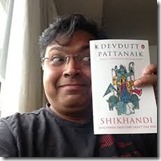Tags
alternate sex, arjun, arjuna, bheem, ghatotkacha, indra, Krishn, Mahabharata, mythology, shikhandi, shiva, transgender
Oven–fresh offering by mythologist Devdutt (which means God-gift; and ironically, is a namesake for Arjun’s conch in Mahabharata)
Devdutt takes up the unexplored theme of ‘queerness’ or alternative gender in Mythology. In Part I, he tracks the universal existence of ‘queerness’ across Indian, Persian, Aztec, Viking, Japanese, Mesopotamian and Greek mythology.
Part II is a carefully chosen plethora of ‘queer’ tales. I could discern an interwoven pattern within the chosen tales:
a] Gods with alternate gender – Krishn (click here for enigma of Krishn) as Mohini seduces Shiva to produce Ayyappa, thus making a blood-bond between 2 warring devotee sectors.
b] Father –son duos with alternate gender –
Indra (emasculated for not showing restraint towards Ahalya) vs Arjun (emasculated for showing restraint towards Urvashi);
Krishn (playing purposeful Mohini) vs Samba (whose purposeless prank eventually led to Yadava annihilation);
Bheem (playacting for Keechak’s death) vs Ghatotkach (playacting for Abhimanyu’s marriage);
c] The emotional aspect of ‘queerness’- Devdutt highlights it rather than merely focus on the physical aspect –
i] Chudala, whose feminine wisdom is unacceptable to her King unless she transforms into an acceptable intellectual male.
ii] Narada , who leans on either side of the gender curve, thus learning to see events from other points of view.
d] ‘Modern’ techniques vs mythology:
i] Caesarian delivery-Ashwini cutting open the pregnant King’s abdomen.
ii] Gender change/organ donation – Shikhandi’s male organ transplant.
iii] Wombless births- Dhristhadyumna and Draupadi.
e] Krishn’s Mohini partakes in 3 separate episodes for procreation (Ayyappa), destruction (Bhasma-asura) and sacrifice (Iravan).
f] Arjun constellation: Delighted to find my personal hero Arjun (click here for my fascination with Arjun), the peerless Mahabharata warrior at the core of 6 diverse tales (albeit 4 folk tales)
The male to female transformation as a Krishn admirer; the resolute non-seduced monk (w.r.t Urvashi), the eunuch-dancer Brihannada who routs the entire Kaurav army; the amorous seducer (w.r.t Alli), the reluctant warrior-lover-husband who ‘tamed’ Amazonian queens into ‘domesticated’ wives (Chitrangada , Pramila).
Grudge: 1. Shikhandi is described as a pawn brought into Kurukshetra only on day 10 for Bhisma’s death. Truth is that Shikhandi was an integral official part of Kurukshetra from day 1 to day 18.
2. Detailed sub-text would have been more lively. On the other hand, perhaps
it more fun to discover sub-texts on our own.
Verdict: This book is a celebration for those who ‘do not fit in’. As Devdutt puts it succinctly, ‘Vi-vaad is based on doubt & argument, thus narrowing truth to a single, stubborn perception. Sam-vaad is based on discussion, so that ‘my truth and your truth amalgamate towards an expanded infinity.’
Recommended for fans of mythology, of unexplored avenues, of broad perspectives; and of good writing skills.
Publisher: Zubaan & PenguinBooksIndia.
Pages: 178
Price: Indian Rupees 261/-



Thanks for the excellent review. Just one suggestion. It would be more helpful to your readers if you had written some details about the book – Publisher, Number of Pages, Price, and any other info.
LikeLike
Hi, real good suggestion. Somehow , it did slip my mind. Will add it to the edited version of blogpost.
LikeLike
Thanks for the update Sweety. Will look it up.
LikeLike
Sure. Especially if mythology intrigues you, as much as it does me.
LikeLike
This is right in time!! I am a fan of Devdutt’s writing and I wanted a review before I got hold of this book. Thanks much! 🙂
LikeLike
At your service, Manasaa. Go for it.
LikeLike
Hi we often discuss Devdutt’s articles in class and the students love it. But this review has kindled my interest to read this book.
Many thanks.
LikeLike
Hi, you are a professor? What kind of students do you have? Must be riveting to have such discussions in class. Education sure has expanded from our times.
Are you a mythology buff too?
LikeLike
Gotta buy it asap! Thanks for the post
LikeLike
Enjoy it! Ur most welcome.
LikeLike
Excellent review. 🙂
LikeLike
Thank you Avinash. Honored for the appreciation from a great reviewer himself! Did you read the book? What say you?
LikeLike
I think so we both picked the book at the same time (I know that because of goodreads). I reviewed the book too (not as detailed). Here is the link http://wp.me/p18IHE-hA
LikeLike
Yes, I already read the review on your site. Even posted a comment, albeit related to Aryavarta series author.
LikeLiked by 1 person
yeah i saw that
LikeLiked by 1 person
The author not only narrates the legends but offers extensive commentary to place the stories in proper context.
This book also inspired me to do research on the places, myths and people mentioned in the stories.
Devdutt portrays a cast of very real characters, some of whom weren’t my favorite till I read this book.
What I like most is Devdutt Pattanaik’s use of illustration to depict his ideas; the way my science teacher used diagrams.
LikeLike
Hi Neha
You did research? Wow! On which of the myths, places and people? Would love to know more.
Also intrigued by ‘characters’ who have turned your favorite. Which ones exactly do you mean?
I deduce, from ur last sentence that you are into science and art; that’s an unusual combination.
LikeLike